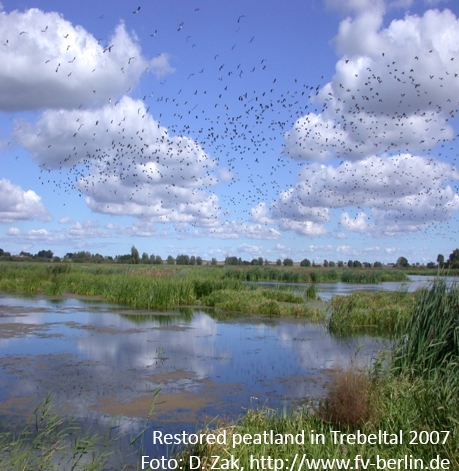This is a guest post by Heidi Wittmer from Helmholtz Centre for Environmental Research in Germany. This comment is the expression of the author’s thoughts and experiences and such is acknowledged as a fruitful contribution to the discussion on biodiversity offsets. If you want to react or clarify your own position (underpin or disprove Heidi’s reasoning), please leave a reply below!
 With the adoption of its 2020 Biodiversity Strategy the EU has made a commitment to halt “the loss of biodiversity and the degradation of ecosystem services in the EU by 2020, and restoring them in so far as feasible”. To reach this goal the European Commission works towards an initiative to ensure there is no net loss of ecosystems and their services (e.g. through compensation or offsetting schemes) by 2015. This action is accompanied by a public consultation on the planned No Net Loss Initiative (see my previous post for more details). The discussion on the introduction of biodiversity offsets as part of this initiative is very lively and controversial: some expect a European legal framework on biodiversity offsets would set minimum standards to protect and restore the normal landscape outside protected areas, others fear that this would foster even more develoment and environmental degradation.
With the adoption of its 2020 Biodiversity Strategy the EU has made a commitment to halt “the loss of biodiversity and the degradation of ecosystem services in the EU by 2020, and restoring them in so far as feasible”. To reach this goal the European Commission works towards an initiative to ensure there is no net loss of ecosystems and their services (e.g. through compensation or offsetting schemes) by 2015. This action is accompanied by a public consultation on the planned No Net Loss Initiative (see my previous post for more details). The discussion on the introduction of biodiversity offsets as part of this initiative is very lively and controversial: some expect a European legal framework on biodiversity offsets would set minimum standards to protect and restore the normal landscape outside protected areas, others fear that this would foster even more develoment and environmental degradation.
This post is the first in a short-run series encouraging you to have your say on the consultation on the EU No Net Loss initiative until Friday, October17 (consultation closes) and to help you make an informed decision.
Biodiversity offsetting can, under certain circumstances, improve nature and biodiversity conservation:
- It should strictly follow and secure the mitigation hierarchy, in all its steps, where compensation is a last resort for a residual impact. Conserving old growth or high nature value habitats should not be compensated — no trading off of Natura 2000 habitats and the like. If this is not ensured offsetting would be a step backwards.
- Compensation rules should ensure: type of biodiversity is similar, time lags as short as possible and distance of compensated elements or habitats as low as possible. Particularly cultural services can not be compensated over large distances. For habitat protection of endangered species size and connectivity of compensated habitat should match requirements of species to be protected.
- Implementation rules should be enforceable, and enforced.
- Rights of local people to locally available services and biodiversity values should be safeguarded.
Expected outcomes at European level and for Germany
If these conditions are met there is a good chance that the situation in many European countries can improve, for Germany, expected changes coming from the EU level are low, as the German “Eingriffs– und Ausgleichsregelung” is based on the mitigation hierarchy and includes the options of compensating for residual impacts through offsetting.
At the political level there are two important challenges:
- In the current institutional setting and the proposals of President Junker and his team so far it seems unlikely rules will be set to strongly support conservation or even follow the mitigation hierarchy.
- At the local level the option of offsetting can lead to making legal obligations tradeable, and maybe even more importantly delegitimizing local resistance to biodiversity degradation and destruction by via compensation elsewhere.
More from the short-run series on the consultation on the EU No Net Loss Initiative
The short-run series on the Biodiversity Offsets Blog on the consultation on the EU No Net Loss Initiative includes the following posts:
1. Consultation on the EU No Net Loss Initiative: Biodiversity offsetting can, under certain circumstances, improve nature and biodiversity conservation — a comment by Heidi Wittmer (this post)
2. Why would you say NO to the EU No Net Loss initiative?

Pingback: Why would you say NO to the EU No Net Loss Initiative? - Biodiversity Offsets Blog
I agree with the four points that Heidi notes. I would add another important point and that is having scientifically based methodologies for measuring gains and losses is also important in ensuring that sound conservation outcomes are achieved.
Pingback: Why would you say YES to the EU No Net Loss Initiative? - Biodiversity Offsets Blog
Good point, Patrice. The problem is the plurality of methods which makes it in practice even more complicated, less transparent and comparable. This is in particular true for the situation in Germany, where, however a slight preference for biotope valuation procedures can be noted. From your experience, could you specify a preferable methodology or should this be case specific in your opinion?
Pingback: Have your say – even if it’s a MAYBE: Consultation on the EU No Net Loss Initiative closes today! - Biodiversity Offsets Blog